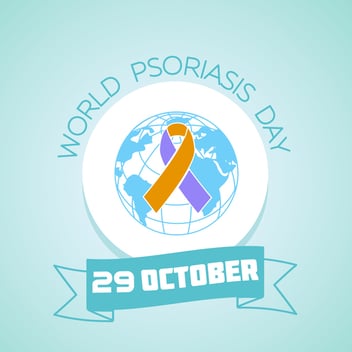With November being Healthy Skin Month, it’s the perfect time to give some extra attention to issues facing those with psoriasis. There are nearly 7.5 million Americans living with the dry, scaly, painful patches of skin typical of psoriasis. The most likely areas affected by psoriasis include skin around joints, face, neck, trunk, arms, hands, feet, and scalp.
Although there are a growing number of medication choices for managing psoriasis symptoms, a cure remains out of reach. Psoriasis can lead to far more health concerns than dry skin. Nearly one-third of those with psoriasis will later develop psoriatic arthritis. In addition, the presence of psoriasis is associated with a higher risk of diabetes, heart disease, and depression.
Psoriasis also correlates to skin cancer, in that patients with psoriasis have a 1.53-fold greater risk of developing melanoma or a hematologic cancer when compared to individuals without psoriasis. This connection with skin cancer was found to be even stronger as the severity of psoriasis increased. Current thinking holds that the inflammation involved with psoriasis serves as a contributor to skin cancer.
There are steps anyone can take to lower the risk of skin cancer such as: using sunscreen diligently, staying out of the sun during peak hours, never using tanning beds, and checking skin for any suspicious moles. Furthermore, it makes sense, for a variety of reasons, to enact a treatment plan to address psoriasis symptoms.
Sources
Trafford AM, Parisi R, Kontopantelis E, et al. Association of psoriasis with the risk of developing or dying of cancer. JAMA Derm 2019 doi:10.1001/jamadermatol.2019.3056
Reddy SP, Martires K, Wu JJ. The risk of melanoma and hematologic cancers in patients with psoriasis. J Am Acad Dermatol 2017;;76(4):639-47.
Related Posts
Psoriasis Social Stigma
More than 8 million Americans experience the uncomfortable, chronic skin condition of psoriasis....
Psoriasis: Can Sleep Troubles be a Red Flag?
The calling card of psoriasis is uncomfortable skin symptoms, such as red patches of dry, cracked...
Hearty News About Psoriasis
The skin condition psoriasis has a well-known connection to heart health. Unfortunately, the...
World Psoriasis Day
This week it’s all about bringing attention to psoriasis and psoriatic arthritis as we close in on...





